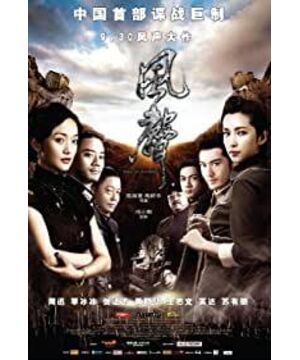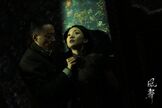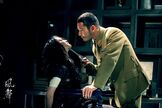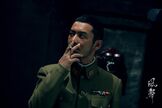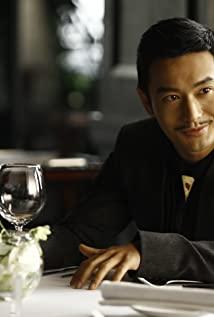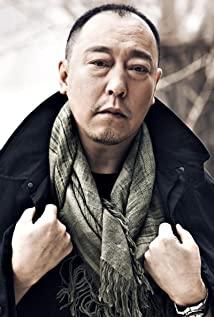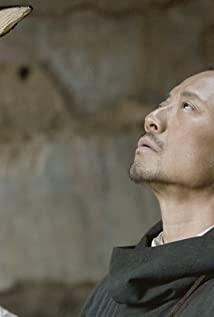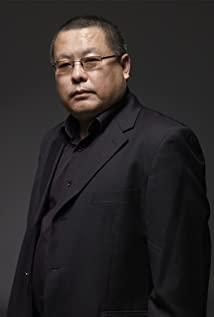The process of the five intelligence officers of the "North China Bandit Suppression Command" being interrogated and fighting in Qiuzhuang is a bright line in the film, and the use of parallel montages makes the CCP underground party's assassination of the Japanese army and senior officials of the puppet government as a Dark lines lay out. All parallels must cross, and all crosses must be parallel. These two lines, light and dark, under the treatment of parallel cross montages, constitute the big frame of the film. On the one hand, the "old ghost" tries every means to spread the information in the field of life and death. Going out, on the one hand, the CCP underground party received a fake action order from Baicaotang and was arranging murder, and the "old ghost" was the meeting point between these two lines. The use of parallel cross montage has also achieved the expected effect. Compared with the suspense of who is the "old ghost", what can tighten the audience's heartstrings is whether the "old ghost" whose life is at stake can break through hell and complete the mission in this situation. It seemed even more shocking. Parallel cross montage is widely used in the film. For example, when five people wrote their resumes in Qiu Zhuang, they developed synchronously but managed independently. The use of this kind of montage has simplified the complicated, strengthened, accelerated and accelerated the rhythm of the film, making the focus on "character recognition". " instead of "writing". The application of parallel cross montage at the climax is particularly prominent. In the last scene of the film’s ambush in the Hundred Herbs Hall, on the one hand, Takeda and the commander set up a net to catch turtles in the urn; . Can the information come out in time? Will the heroes be wiped out? As "October 31st" approaches, the parallel cross montage stretches the audience's heartstrings to the tightest, creating a tense and intense atmosphere in the film, strengthening the sharpness of contradictions and creating a strong suspense effect. As the anti-Japanese heroes get intelligence to call off the murder, the two lines merge and continue to push the film to a climax. As Eisenstein said: "The alignment of two montage shots is not the sum of the two numbers, but the product of the two numbers." Parallel cross montage concentrates the entire process of the development of the plot, expands the amount of information in the film, and also It strengthens the tense rhythm of the plot paragraphs and enhances the suspenseful effect and emotional appeal of the film as a whole.
The Tangshan shadow play "Empty City Strategy" was sung by Captain Wu many times in the film, and the repeated montage gave "Empty City Strategy" a deeper and more critical role. When Wu Zhiguo sang "The Empty City" on the night when he entered Qiu Zhuang, Wu and Gu were already tacitly aware of it. When Wu Zhiguo was dying of torture, they sang "The Empty City" again. It can be said that the two repetitions of the tune are the film. The two key points in the book, one is the reunion of comrades, and the other is the key to the murder operation. Under the deconstruction of repeated montages, the meaning of "The Empty City" can be emphasized and deepened, and Captain Wu's perseverance, agility and loyalty are vividly displayed. Repeated montages are used to show Qiu Zhuang's dark scenery many times, creating a lonely and terrifying atmosphere, and each display makes the audience feel more worried and dignified in their hearts. In the film, Morse code is displayed in text by means of special effects for many times. The repeated montage allows the audience to rationally understand the action goal of the "Old Ghost", but emotionally increases the question of who is the "Old Ghost". Seems like a solution. The use of repeated montage not only makes the plot of the film full of imagination and suspense, but also achieves the deconstruction connotation of the postmodern time and space of the film.
The characters and thematic significance of the film are displayed in the contrast montage, and Gu Xiaomeng and Wu Zhiguo must be the protagonists in this contrast montage. When Li Ningyu said "Liu Linzong has been gone for several days", although the expressions on the faces of Li and Gu were not much different, they formed a deeper contrast. Gu Xiaomeng seems to be calm, but his heart is extremely entangled and painful. Liu Linzong should be his boyfriend, but for the sake of revolution he had to make his beloved become the enemy's lover. It was the loyalty and belief of the country that made Gu Xiaomeng act so calm at this moment when he should not have been calm. Why did the revolution win? Why? It's because Li Ningyu dedicated his heart to love, while Gu Xiaomeng dedicated his heart to the country... The performance of the five people in Qiuzhuang, especially when they were tortured, formed a sharp contrast. Li Ningyu was punished by Takeda for "naked tailoring" After that, she was almost crazy and could give up her arrogance and talent, but she chose to let herself be humiliated alone in such a conservative age because of saving her boyfriend. From this point of view, Li Ningyu is a great woman. Bai Xiaonian was wronged and tortured and died. Before his death, he begged for mercy. As the commander-in-chief of the puppet army, he was supposed to be "under one person, and above ten thousand people". With the fragility of the heart, it exposes the insidiousness and darkness of the internal governance of the pseudo-national government. Jin Shenghuo's old-fashioned gold-rimmed eyes and a smirk-like jaw fully demonstrated that as the director of the military aircraft department of the puppet army, he was a slick, ignorant official. Due to pressure and fear, Jin Shenghuo chose to commit suicide, and he was also a puppet citizen. The government's corrupt nepotism fell to the ground at the sound of gunfire. "Old Gun" Wu Zhiguo remained stubborn and unyielding after being electrocuted and stabbed; "Old Ghost" Gu Xiaomeng wanted to die after enduring rope torture to convey information. The sentence "please report me" interprets the CCP revolutionaries' view of death as reunion Patriotism. Through various comparisons, it reflects the wit and strength of the heroes of the CCP, and praises them for their disregard for personal life and death, and their incomparable sincerity to the country. As the original Mecca said: "These agents are fighting their wits and courage in a dire environment. I think what can support them in their actions, regardless of their lives or death, is their belief. Because they have a way of defending the country and defeating the enemy. Their beliefs are used as their spiritual pillars, and they have produced unimaginable perseverance." Faith is the source of endless power. Our age also needs such beliefs. In this sense, this is a movie that calls out to the true self and the heart. The biggest contrast in the film is actually the contrast between the cruelty of the film itself and the happiness of reality. The deeper you dig, the more you cherish a happy life. Contrast montages are ubiquitous in the film. The comparison of Qiu Zhuang’s two dinners, the comparison of the relationship between Gu and Wu, it is this kind of montage thinking that makes the composition of the shots not just laying bricks and tiles, but It's a high-profile, suspenseful outburst.
The dark and dead background of the film is a big metaphor montage, which is a metaphor for the cruelty and darkness of Qiu Zhuang, and it also symbolizes the cruelty and darkness of the puppet national government at that time. In the film, after the five people wrote their biographies, Qiu Zhuang's lights went out immediately, implying the real coming of darkness and death. The objective shot at this time was switched to Li Ningyu's subjective shot: Bai Xiaonian was forcibly taken away, The beginning of death... Interestingly, Gu Xiaomeng's name is also a metaphor. The opening ceremony's line was defined as "Zhuang Shengxiao dreamed of butterflies", which has the meaning of awakening the people's patriotism and enlightening the people. The poet Browning said: "Love, hope, fear and belief constitute human nature, and they are the signs and characteristics of human nature", as if to say for Gu Xiaomeng... It is difficult to let go of love, hope for the success of the revolution, and the tortured Fear, belief in the country and the people... Such complex emotions constitute the tension of the film. This can't help but remind one of Zhou Xun's words in the film: "I never thought I would survive this war..."
Psychological montage is not the most used in the film, but it is the most brilliant. When Li Ningyu's clothes were slowly cut off by Takeda's scalpel, the psychological montage made her recall the scene of her boyfriend Liu Linzong performing a drama, which not only made the film surprisingly successful in terms of plot structure, but also allowed Li Ningyu to be supported by love. Prove his "innocence". Wu Zhiguo's clarification of the truth to Li Ningyu was also placed in a psychological montage, which enabled the suspense to be solved with a unique artistic technique, which not only left the suspense at the end of the film, but also made this patriotic emotion transcend the boundaries of life and death. The end of the film ends with Gu Xiaomeng's narration, which not only relieves the violent and dark emotional tone of the film, but also makes the audience emotionally resonate with the sentence "The old ghost is not a person, but a spirit and a belief", which makes people think of " A classic line by Yan Haiqing in Qiu Xi: Because those who do our latent work are actually dead people... The psychological montage carries the film's final climax: Li Ningyu looked back and saw Xiaomeng sitting on the chair, at this time The emotional expression of a montage is far better than its structural form. A pair of sisters with deep feelings are indeed separated from life and death because of their different beliefs. They can only "souls be with you..." Li Ningyu's deep love for Xiaomeng, thinking about The cut has once again sublimated Gu Xiaomeng's patriotic beliefs and deepened the theme of the film.
Zhou Xun's old ghost acted really well.
View more about The Message reviews


